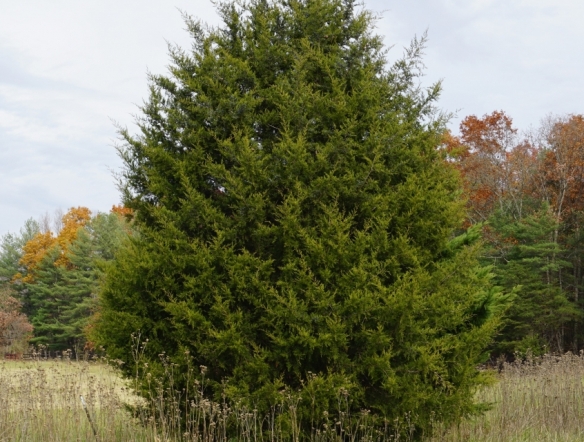
A few weeks ago, while doing a kitchen remodel, we were shopping to replace a set of shelves. We searched everywhere: home centers, department stores, etc. only to find that the only shelving unit that fit our area was a cedar shoe rack from the bedroom section of a department store. It was designed to store shoes in a closet and was made of cedar wood to keep stinky shoe odor under control. After some minor modification we had ourselves a perfectly sized double shelf that smelled like cedar.
The whole experience triggered “that-smells-good “memories of cedar chests, cedar closets, cedar drawer freshener pillows. You get the idea, the smell of cedar. So what else comes from cedar? Oils and resins that are used for many other purposes things besides preventing stinky shoes.
The Cypress plant family to which cedar trees belong 380 species worldwide but our focus is the plant family Juniperus. The Eastern Red Cedar along with Common Juniper and White Juniper or Arborvitae (tree of life) is the best known in North America.
Cedar wood oils have been used for thousands of years medicinally and for more industrial uses. Ancient Samarians mixed cedar oil with ground pigments as a carrier and preservative for paint. Ancient Egyptians used it as part of the mummification process. Medicinally a Juniper leaf tea was used by Native Americans to prevent scurvy or vitamin C deficiency. This information was then passed on to early explorers. Symbolically, Cedar tree are often found planted in old cemeteries as they represent eternity in the lore and language of plants.
Cedar oil is also used as an antifungal and antibacterial ingredient in salves and soaps, insect repellants and in Aromatherapy. It seems to keep bad stuff away and that is why people have been using cedars chests for centuries to repel moths from fabrics when they are stored.
How and when to use: Pure cedarwood oil is strong stuff and should be used in a diluted form, in carrier oils, 2-3 drops, and never ingested. Pregnant women should not use cedar oil at all. Any use other than topically, a person should consult a medical professional. Cedar wood oil cannot be ingested in any quantity and can cause internal damage and vomiting. It can also cause topical reactions in sensitive individuals, so a patch test is advisable. All that being said, it still smells good.
Juniper berries are used to flavor some meat and vegetable recipes and to flavor gin. Juniper berries are also a favorite with birds and Eastern red Cedar is spread by them.
Caron Wenzel is an Environmental Educator, writer, and owner of Blazing Star Inc., a native plant seed nursery and consulting business. Blazing-Star.com.
Related Articles & Free Email Newsletter
Proper Planting Instructions for Trees and Shrubs
Understanding Stressed Trees: Insects, Disease & Environment



Comment here